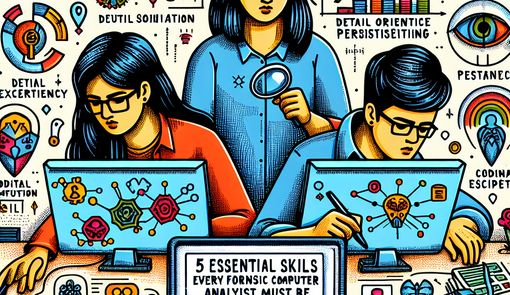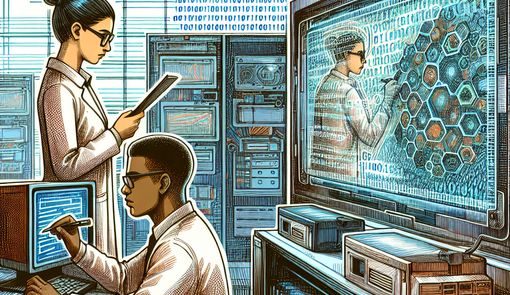Forensic Computer Analyst
Forensic Computer Analysts investigate digital crimes and analyze electronic data to assist in legal proceedings and criminal investigations. They use specialized software to recover data, trace hacking attacks, and provide expert testimony.

Top Articles for Forensic Computer Analyst
Sample Job Descriptions for Forensic Computer Analyst
Below are the some sample job descriptions for the different experience levels, where you can find the summary of the role, required skills, qualifications, and responsibilities.
Junior (0-2 years of experience)
Summary of the Role
As a Junior Forensic Computer Analyst, you will support the investigation of crimes involving digital evidence and assist in the recovery and analysis of data from electronic devices. You will work closely with senior analysts to learn and apply forensic techniques and contribute to building cases against individuals or organizations involved in criminal activities.
Required Skills
- Strong analytical and problem-solving skills.
- Attention to detail and the ability to meticulously document investigative processes.
- Effective communication skills, both written and verbal.
- Familiarity with programming languages and database systems.
- Capacity to work under pressure and handle sensitive information discreetly.
Qualifications
- Bachelor's degree in Computer Science, Forensic Computing, Criminal Justice, or a related field.
- Certification or practical knowledge of forensic tools such as Encase or FTK.
- Basic understanding of legal procedures relating to digital evidence.
- Ability to obtain a security clearance.
Responsibilities
- Assist in the collection, preservation, and analysis of digital evidence.
- Support senior analysts in processing and examining data from various digital sources including computers, smartphones, and other electronic devices.
- Document findings and prepare evidence for use in legal proceedings.
- Stay up-to-date on the latest tools and techniques in digital forensics.
- Participate in on-the-job training and workshops to improve technical skills.
- Adhere to legal guidelines and maintain confidentiality and integrity of data.
- Collaborate with cross-functional teams, such as law enforcement, IT professionals, and legal experts.
Intermediate (2-5 years of experience)
Summary of the Role
The Forensic Computer Analyst is responsible for investigating cybercrimes by analyzing digital data and computer systems. This role requires a keen eye for detail, in-depth knowledge of forensic tools, and the ability to interpret complex data to assist in legal proceedings or corporate investigations.
Required Skills
- Proficiency with forensic software such as EnCase or FTK.
- Strong analytical and problem-solving skills.
- Familiarity with operating systems, networking, and hardware.
- Excellent written and verbal communication skills.
- Ability to work independently or as part of a team.
- Knowledge of cybersecurity principles and practices.
Qualifications
- Bachelor's or Master's degree in Computer Science, Cybersecurity, or a related field.
- Certifications such as Certified Computer Examiner (CCE) or Certified Forensic Computer Examiner (CFCE).
- A minimum of 2-5 years' experience in computer forensics, information security, or a related field.
- Strong understanding of the legal aspects of digital forensics and evidence handling.
Responsibilities
- Conduct computer forensic examinations to retrieve data from various digital devices.
- Work with law enforcement agencies to provide evidence for legal cases.
- Analyze and interpret electronic data to identify cyber threats or potential security breaches.
- Prepare detailed reports on findings for legal teams or management.
- Stay updated on the latest cyber threats and forensic methodologies.
- Collaborate with IT security teams to enhance cyber defense strategies.
- Testify in court as an expert witness when required.
- Maintain the integrity and security of data throughout the forensic process.
Senior (5+ years of experience)
Summary of the Role
As a Senior Forensic Computer Analyst, you'll be expected to lead complex investigations into cyber incidents, advise on data security issues, and develop strategies for digital forensic analysis. Your experience will empower our team to handle high-stake cases efficiently, ensuring the integrity and confidentiality of sensitive data.
Required Skills
- Expertise in forensic software tools such as EnCase, FTK, or X-Ways.
- Strong understanding of various operating systems and file systems.
- Proficiency in handling and analyzing network traffic and logs.
- Ability to script or program in languages like Python or Bash to automate tasks.
- Exceptional problem-solving skills and attention to detail.
- Strong communication skills, both oral and written.
- Knowledge of cybersecurity principles, practices, and investigation techniques.
- Leadership and team-management skills.
- Continual learning to keep up with the evolving cyber landscape.
Qualifications
- Bachelor's or Master's degree in Computer Science, Digital Forensics, or related field.
- Minimum of 5 years of professional experience in digital forensics or incident response.
- Professional certifications such as Certified Computer Examiner (CCE) or Certified Forensic Computer Examiner (CFCE).
- Proven court experience as an expert witness is highly desirable.
- In-depth understanding of federal and state laws relating to digital evidence.
Responsibilities
- Lead forensic analysis of digital information and gather evidence for legal cases involving cybercrimes.
- Provide expert witness testimony on findings in court.
- Advise law enforcement agencies on the handling of digital evidence.
- Collaborate with cybersecurity teams to strengthen security measures.
- Design and deliver training programs on computer forensic practices to junior analysts.
- Develop novel forensic analysis techniques to handle emerging cyber threats.
- Coordinate with other analysts and stakeholders in high-profile investigations.
- Draft detailed reports on findings and recommendations for varying audiences, from technical specialists to non-tech-savvy stakeholders.
- Stay abreast of the latest trends in cybercrime and digital forensic technologies.
See other roles in Business, Consulting, and Legal Services and Legal






